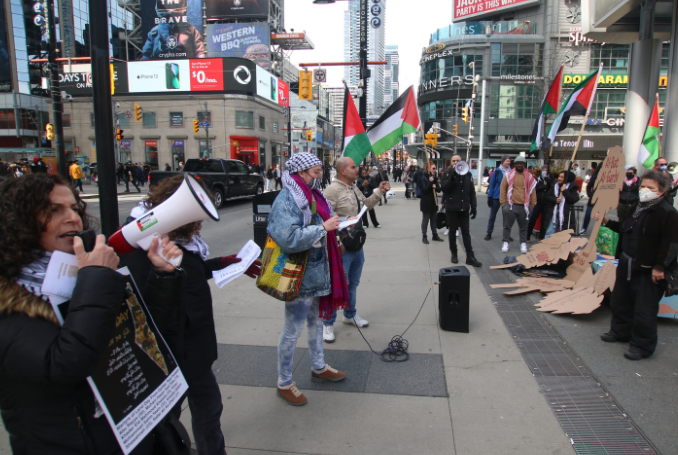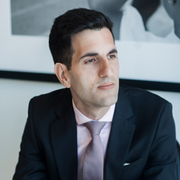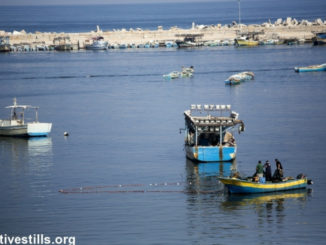
There was a story recently in Canadian news. In it Palestinian-Canadian professor, Samer Abdelnour, remarked:
“It’s tiring. I feel like growing up in Toronto, the narrative has been so hostile against Palestinians. … It’s just tiring to face this sort of constant aggressiveness and denial. It really is an act of erasure.”
Though the story is primarily about the legality and lack of ethics surrounding not properly labelling Palestinian wines, Abdelnour’s words—perhaps because of my own lived experience—left a stronger impression on me than the story itself.
As a Palestinian ally, I find it challenging living in the Toronto political riding of York Centre. As I wrote about previously, this is in part because its federal member of Canadian parliament is an express Zionist and—denying that Israeli is an apartheid state—doesn’t take the plight of Palestinians seriously. I thus would never rely on them, though I tried once, to have a serious conversation about how Canada can become more proactive in ending Israeli oppression. At best they might try to verbally placate me. That of course, aside from dishonest, is a far cry from doing anything substantive.
Then you have the riding’s municipal councillor, member of provincial parliament and the public school trustee. Each are not only open supporters of Israel but have pushed back against Palestinian solidarity, including the February BDS motion that passed in the University of Toronto Student Union.
Also in recent memory is how the trustee all but tried to get Toronto District School Board (TDSB) equity and educational worker, Javier Davila, fired for circulating important literature on Palestine, covering its history, culture, ways of politically resisting and the Israeli campaign of ethnic cleansing against it. The trustee was criticized for in as part of a TDSB investigation into that matter though the Board itself did not, contrary to what was suggested by investigation report, vote to formally censure them. In fact they voted against that so effectively condoned their actions.
These public officials create an anti-Palestinian climate. Their behaviour says: Palestinians are undesirables, people not worthy of full dignity and respect. Moreover, whenever they take issue with Palestinian solidarity they never talk about Israel’s own criminality. This makes it seem to those who might not know much about Israel that such solidarity is strange or unwarranted. If the officials were more honest and transparent they would address this criminality (even a wrongdoer is capable of integrity).
But of course they won’t. To do so would illuminate how Palestinians are the regular targets of Israeli brutality—from home demolitions and extrajudicial killings to military harassment and arbitrary imprisonment. In turn those fighting against it would be seen as opposing sheer inhumanity. Indeed this is neither strange or unwarranted but purposeful and just.
What is particularly galling about the officials is that they, at least on the surface, support many social justice causes. Deceptively this is them attempting to show they genuinely care about human rights. Such care, however, extends to all. In fact, Palestine should be a priority if you’re involved in social justice, given the severity and longstanding nature of Israeli oppression. Conversely, the officials are trying to make what Italians call a “bella figura” or favorable impression to the public. Aside from being a generally likable trait, this helps them gain votes. Yet what kind of leader values doing what’s right? Seeks electoral victory while avoiding any condemnation of the illegal occupation of Palestine?
Sometimes the denial that Abdelnour identifies takes the form of complete silence. I experienced this when I reached out to the trustee to ask about why they, in a public Facebook post, both alluded to Davila and clearly misframed the materials he was circulating as antisemitic. This was not only important to me since the post was dishonest but their answer would tell me whether there was any chance of dialogue with them. In retrospect this was naïve but at the time I was hoping it would materialize. Dialogue would have provided a basis on which to have an honest discussion, where I could have challenged the validity of the trustee’s post and petitioned them—as a constituent—to better include materials on Palestine in TDSB curricula.
Despite making at least two earnest inquiries to the trustee by email I never heard from them.
Those like the trustee make you feel like you’re doing something bad. That you’re not asking for something that is right and necessary, in this case, greater justice for Palestine, but something unethical or even criminal. They stonewall you for acting according to moral principles that they themselves should be doing as well.
But the last thing we should ever do as individuals involved in the struggle for Palestinian justice is ever resign, give in to whatever demoralization the silence or denial that those who have contempt for such justice show us. That’s what they want. That is, psychologically, part of the Israeli settler-colonial project, which also seeks to condition others to be discouraged from fighting for Palestine. Rejecting this we must collectively stick together. In numbers we make noise. Our voices will be heard far above the silence of public officials. Then they will have no choice but to respond and be held to task for whatever anti-Palestinianism with which they respond.
That matters. That’s how their legitimacy in the public eye is undermined, perhaps appearing in the process as something like proxies for Israel. And the more that happens the more people will be less afraid to talk about and act to achieve justice for Palestine.
Leaders that don’t universally respect human rights command little respect.

– Paul Salvatori is a Toronto-based journalist, community worker and artist. Much of his work on Palestine involves public education, such as through his recently created interview series, “Palestine in Perspective” (The Dark Room Podcast), where he speaks with writers, scholars and activists. He contributed this article to The Palestine Chronicle.








